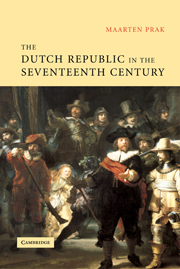Book contents
- Frontmatter
- Contents
- List of illustrations
- Acknowledgements
- Chronology
- Map
- Introduction: The enigma of the Republic
- 1 A turbulent beginning
- Part I War without end
- Part II Golden Age: economy and society
- 6 A market economy
- 7 A worldwide trading network
- 8 Riches
- 9 Toil and trouble
- Part III Unity and discord: politics and governance
- Part IV An urban society
- Conclusion: The end of the Golden Age
- Further reading
- Index
6 - A market economy
Published online by Cambridge University Press: 05 February 2015
- Frontmatter
- Contents
- List of illustrations
- Acknowledgements
- Chronology
- Map
- Introduction: The enigma of the Republic
- 1 A turbulent beginning
- Part I War without end
- Part II Golden Age: economy and society
- 6 A market economy
- 7 A worldwide trading network
- 8 Riches
- 9 Toil and trouble
- Part III Unity and discord: politics and governance
- Part IV An urban society
- Conclusion: The end of the Golden Age
- Further reading
- Index
Summary
People came from far and wide to an auction held in Alkmaar on 5 February 1637. The regents of the Civic Orphanage were selling the estate of the innkeeper Wouter Winkel. It was not the furnishings of his inn, however, which made the auction worthwhile. Several years before his death, Winkel had started trading in tulip bulbs, and in a very short time he had become one of the richest men in Alkmaar. He possessed specimens of such rare varieties as Admirael van Enkhuizen and Paragon Schilder, and no fewer than seven bulbs of the highly coveted Gouda variety, all of which were on sale. The Admirael van Enkhuizen bulb alone fetched an incredible 5,200 guilders, and the proceeds of the sale amounted to 90,000 guilders. To put this in perspective, in those days a professor at Leiden University received an annual salary of 1,500 guilders, and a stately house on the Rapenburg canal in Leiden cost less than 20,000 guilders. The tulip auction in Alkmaar was therefore a resounding success, which was all the more remarkable when one considers that half a century earlier the flower had been almost completely unknown in Holland.
In the Middle Ages the tulip, which originated in West China, became a status symbol in Turkey. The son of the Turkish sultan – battling the Serbs on the Field of Blackbirds at Kosovo in 1389 – wore beneath his armour a cotton shirt embroidered with tulips.
- Type
- Chapter
- Information
- The Dutch Republic in the Seventeenth CenturyThe Golden Age, pp. 87 - 110Publisher: Cambridge University PressPrint publication year: 2005



